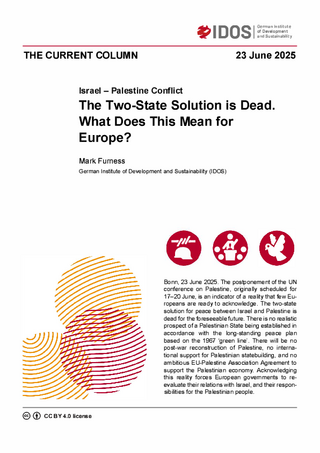Israel – Palestine Conflict
The Two-State Solution is Dead. What Does This Mean for Europe?
Furness, MarkThe Current Column (2025)
Bonn: German Institute of Development and Sustainability (IDOS), The Current Column of 23 June 2025
Bonn, 23 June 2025. The postponement of the UN conference on Palestine, originally scheduled for 17–20 June, is an indicator of a reality that few Europeans are ready to acknowledge. The two-state solution for peace between Israel and Palestine is dead for the foreseeable future. There is no realistic prospect of a Palestinian State being established in accordance with the long-standing peace plan based on the 1967 ‘green line’. There will be no post-war reconstruction of Palestine, no international support for Palestinian statebuilding, and no ambitious EU-Palestine Association Agreement to support the Palestinian economy. Acknowledging this reality forces European governments to re-evaluate their relations with Israel, and their responsibilities for the Palestinian people.
The postponed UN conference was called for by the General Assembly Resolution ES 10-24, and was to be hosted by France and Saudi Arabia. Its objective was to chart a path towards peace based on two states, with roundtables on key issues including security, reconstruction and the future economic development of Palestine. Pro-Israeli voices condemned the conference for ‘rewarding October 7th atrocities.’ The United States issued a diplomatic demarche warning allied countries of consequences if they act against US foreign policy interests by recognising Palestinian statehood. The conference was postponed for ‘logistical and security reasons’ following Israel’s attack on Iran on 13 June.
French President Macron has insisted that he remains determined to continue working for a two-state solution. However, the two-state solution has become progressively less realistic since the Oslo Accords and the optimism of the 1990s. Israeli settlement of the West Bank has made a Palestinian state a territorial impossibility. The removal of Israeli settlements from Gaza in 2005 was followed by the election of Hamas, Israel’s blockade of Gaza, and the tit-for-tat cycle of violence culminating in the 7 October 2023 terrorist attacks on Israel. Israel’s subsequent response to the Hamas attacks has been condemned by many experts as war crimes amounting to genocide. Israel has also used the cover of its war against Hamas to further dispossess Palestinians in the West Bank.
The United States, the only country with real leverage over the Israeli government, has historically supported the two-state solution diplomatically, despite repeatedly vetoing UN resolutions that might have enabled real progress towards it. This pretence has ended. The US has openly envisaged an alternative future that does not include Palestinians. President Trump has mused about a Gaza Riviera where Palestinians are replaced by condominiums and casinos. US Ambassador to Israel Huckabee gave a series of interviews in which he set out a clear American rejection of a Palestinian State, unless one of Israel’s Arab neighbours would be prepared to give up territory to host it.
So what are the alternatives to a two-state solution, and which is the most palatable for Europe? UN Secretary-General Guterres has argued that the two-state solution cannot die, because the alternative is either expulsion of the Palestinians, or a situation where Palestinians remain in Israel without rights. Israeli journalist Gideon Levy has outlined a further alternative: a secular democracy in which all citizens have equal rights.
Mass expulsion would undoubtedly be resisted by Palestinians themselves as well as by neighbouring countries. If Europeans accept that this will happen, then they will have to accept the violence, forced transportation and mass detention camps that would be necessary. Second class status for Palestinians within Israel would deepen the current situation where Israel would cease to be a democracy, because it denies rights to people over which it exercises sovereign control. Since Israel has rejected the prospect of a Palestinian state, it can no longer plausibly argue that Palestinian rights are the sole responsibility of the Palestinian authorities. The other alternative, the one-state solution proposed by Levy and other progressive voices in Israel and elsewhere, would mean no Jewish state and no Palestinian state. Given that there is little prospect that this kind of compromise could be reached, the scenarios requiring Palestinian dispossession and/or apartheid within Israel are much more likely.
Amid the harsh reality of the current conflict, the two-state solution has become diplomatic theatre. In continuing to call for this aspiration, Europeans have avoided hard choices about their relations with Israel and with the Palestinians. With some notable exceptions, European governments have limited themselves to calling for humanitarian access in Gaza and the release of hostages held by Hamas, while continuing to supply weapons to Israel. They have thus avoided standing up for the core values that they espouse. The death of the two-state solution means that alternative scenarios have to be considered, and Europeans have to decide which one they can live with.


